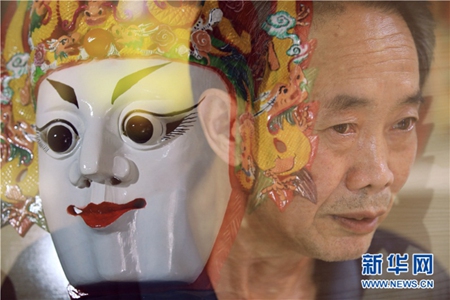

Guizhou's Anshun city is home to the special culture Dixi opera, also known as Di Opera. The opera dates back more than 600 years to the beginning of the Ming Dynasty (1368-1644).
The opera’s roots span back to when the then Emperor Zhu Yuanzhang sent troops to Guizhou to defend Southwest China. Soldiers from different parts brought their cultures to the region, helping create the unique Tunpu culture and Di Opera is a result.
The opera is usually performed during Spring Festival and in July of the lunar calendar when crops ripen. Farmers of the same village perform together to pray for a good harvest and good fortune.
A major part of the opera is fighting scenes, which were included as a way to remind soldiers working in agriculture during peace time to practice their fighting skills in case of war.
Performers cover their heads with cyan scarfs and wear masks on the foreheads and military uniforms around their waists. With weapons in hand, performers of the opera tell stories through song and dance.
The mask is a very important element of Di Opera. Newly-made masks are regarded simply as normal sculptures. However, once the masks go through the religious rite of “opening the light”, they are said to become the embodiment of deities and become divine.
Such exquisite and brightly colored masks require equally exquisite skills to produce. One man who knows this process more than most is 65-year-old An Faxiang, who has been making masks for Di Opera for more than 50 years.
Approximately 1,000 masks have been born out of An’s hands. Though the masks are different in detail, they contain one of four expressions: joy, anger, sorrow and happiness.
“Real life is just like the expressions on the masks. We cannot get rid of these emotions,” said An.
Di Opera was listed as national intangible cultural heritage in 2006 and is known as a "living fossil of drama". As an important element of local tourism, the masks are becoming popular and have been sold in other countries around the world.
 |
|
An Faxiang and his masks of Di Opera. [Photo/xinhuanet.com] |